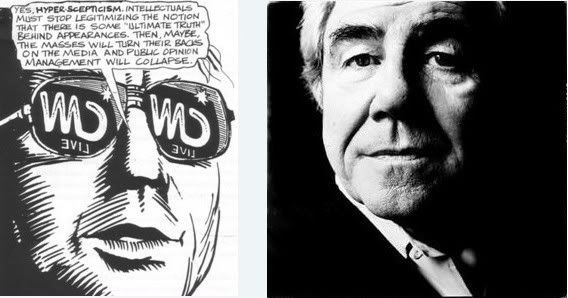Was Baudrillard a Charlatan?
He was an intellectual charlatan. The basic idea that everything is a simulacrum was robustly refuted by the Anglo Saxon tradition in philosophy. It is either dishonest, or if seriously meant, false.
Baudrillard, along with Barthes, Derrida, Foucault etc, illustrates the key weakness of the French intellectual left: their refusal to acknowledge human reality…
All this has its roots in a view that we cannot know what we plainly do know - and could not get through ordinary life without knowing. In the view that what is real is in fact illusory, that what is valuable is of no importance. It is a short step from the view that nothing can be said that is not about the person saying it, to the view that nothing that is done to people or populations has any meaning other than as an expression of feeling by those doing it, and about which nothing meaningful can be said since it too will just be an expression of an equally valid but different feeling…
Any focus on human life as it is lived and felt in the real world that for Baudrillard was a simulacrum would get you out of this immoral and dishonest approach to life on the planet.
The antidote to this idiotic nonsense is GE Moore. You say you believe time is unreal. Are you really saying I cannot say whether I shaved before I ate breakfast? You say you believe the external world is unreal. Do you really mean I am not looking at a chair right now? You say you believe there is no such thing as right and wrong. Do you really mean....?
Next, the commentator accuses Baudrillard, along with much of the Continental tradition, of taking a view of morality that grounds it exclusively on feeling. But I am not aware of any continental philosopher holding that view. The idea that morality is nothing but the expression of a speaker’s emotions was, in fact, never taken seriously as a philosophical doctrine until A. J. Ayer. The special irony, of course, is that for logical positivists the view that morality is just an expression of emotion arises directly out of the view that only the physical world is real; that it is, in fact, the only reality. But Baudrillard never rejects morality; rather, he gives us an analysis of a world in which such things don’t matter, or in which “nothing that is done to people or populations has any meaning” other than as a media spectacle. Perhaps that is too extreme a characterization of our world, and Baudrillard is unquestionably guilty of hyperbole. But if our world is dangerously close to being a world in which all moral considerations, all the horrors of war, are concealed by Hollywood-esque montages on the news, then the best way of affirming the importance of morality may well be to diagnose the social malady that threatens to conceal this importance. This is what Baudrillard tried to do. Perhaps he was not always right, perhaps he was too provocative for his own good, and perhaps he lacked the philosophical depth needed to tackle these problems. But how many Anglo-Saxon philosophers have really made that effort?
But it is also a mistake to see Baudrillard as a philosopher. He is by training a sociologist. And he is something else: a philosophically informed public intellectual, that is, a species so rare in the Anglo-American world that we have trouble recognizing them when we see them. This isn’t to say that nobody tries: plenty of philosophers have political blogs (such as this one), but these tend to vacillate between academic philosophy and political commentary on a level not far removed from that of many other political blogs. Baudrillard tried to do something else: he tried to diagnose the social framework that we inhabit, within which our political and moral decisions take place.
But let us briefly turn to Baurdillard’s most provocative thesis: that reality has been replaced by the simulacrum. First off, again, this is clearly not a version of skepticism: Baudrillard it not doubting reality; rather, he is pointing out that we now experience reality through a media veil; for us, reality is simulated. This idea is both catchy and seemingly insane; when I first read Simulations as an undergrad, I would go outside and stand in the snow, feeling the snowflakes melt on my cheeks, feeling cold wind blowing through me—this, I told myself, was no simulation, it was reality at its strongest. But take something like love. Love, we might think, is the epitome of real human feeling. But in what sense is the obsession with love, my obsession, our cultural obsession, genuine? Where do we pick up the idea that love is the most important human feeling, that without it no life can be complete? From movies, maybe, and from the lyrics to every other song that’s come out in the past 50 years. Benjamin worried that mechanical reproduction would destroy the aura of the work of art; instead, it has perhaps made the works more precious, given them a greater aura. It seems to have done so for emotions. It is not only art works that can be mechanically reproduced; human emotions are just as easy to put on a screen and transmit. In other words, the argument that reality is “real,” and not a simulacrum is a tricky one—which of our feelings, of our perceptions, of our habitual ways of thinking are really “real”? In a way, the point is almost meaningless—of course human feelings, perceptions and thoughts are shaped by their environment; that has always been true, and it has not made these things “less real.” But what if the forces that shape us now are concerned only with more excitement, with sensationalism, with providing an entertaining spectacle? Does that make a difference? Does that somehow corrupt reality, turn it into something else? That was the question that concerned Baudrillard.


